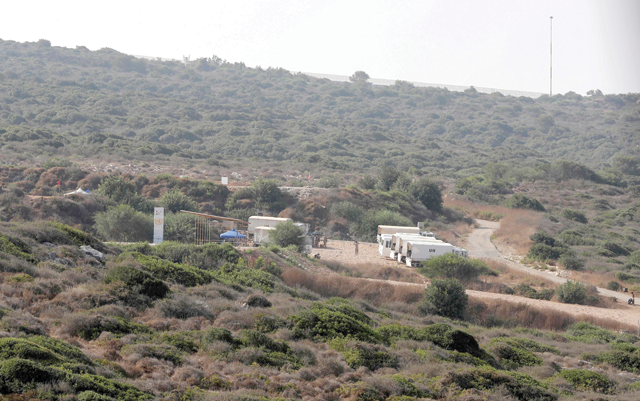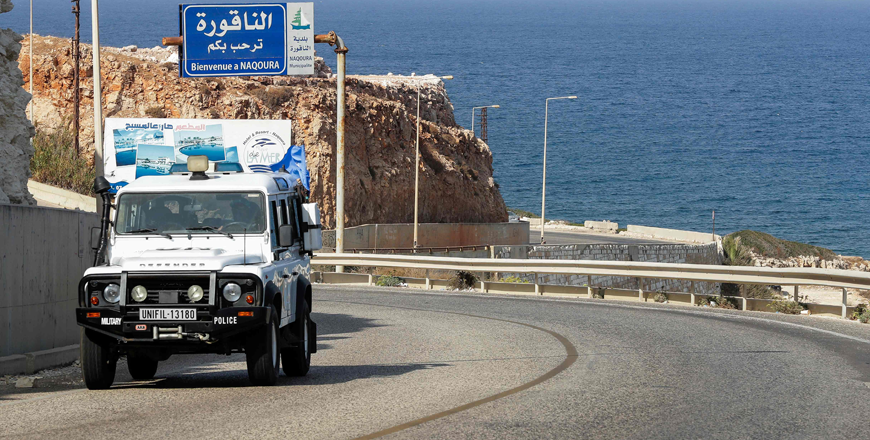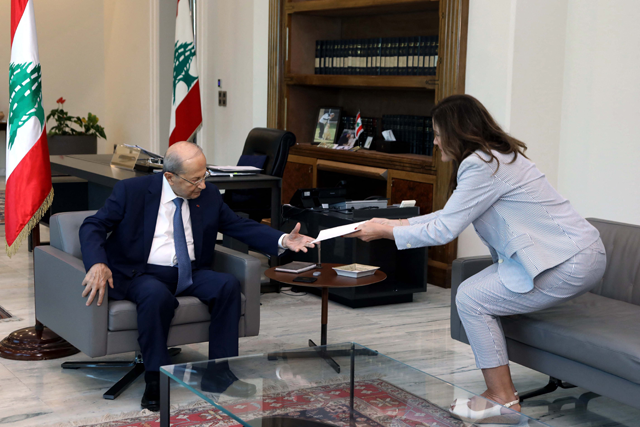You are here
Lebanon to send feedback on US maritime border offer with Israel
By AFP - Oct 03,2022 - Last updated at Oct 03,2022

A photo shows a view of a United Nations peacekeeping force (UNIFIL) firing range in the southernmost Lebanese area of Naqura by the border with Israel, on Monday (AFP photo)
BEIRUT — Lebanon said Monday it will send "remarks" to Washington's proposal to resolve a maritime border dispute with Israel over gas-rich waters, a country it is still technically at war with.
The draft agreement floated by US envoy Amos Hochstein aims to settle competing claims over offshore gas fields and was delivered to Lebanese and Israeli officials at the weekend, following years of indirect negotiations.
On Monday, Lebanon's top leaders met to discuss the offer, delivered via Washington's ambassador to Lebanon, Dorothy Shea.
Crisis-hit Lebanon, which is grappling with it's worst-ever financial downturn, will send its notes on the offer by "Tuesday at the latest," and hopes to receive a response "before the end of the week," deputy speaker Elias Bou Saab told reporters.
"We are not giving an official response but delivering an answer to the proposal with... remarks that we have," he added.
Bou Saab, tasked by President Michel Aoun to oversee US-mediated negotiations, did not elaborate on Lebanon's feedback but said it included notes on "legal and logical" issues.
Prime Minister Najib Mikati, who also spoke after the meeting, said that "things are on the right track".
Washington's offer has not been made public, but it has raised prospects for a deal that could help Lebanon explore potential gas wealth that the debt-ridden country desperately needs.
'Important step'
Lebanon and Israel are officially at war and their land border is patrolled by the United Nations.
They reopened negotiations on their maritime border in 2020, but the process was stalled by Lebanon's demand that the map used by the UN in the talks be modified.
The negotiations resumed in early June after Israel moved a production vessel near the Karish offshore field.
The most recent proposal by Washington was welcomed by both Israel and the Iran-backed Hizbollah group, which considers Israel its arch-enemy.
Hizbollah leader Hassan Nasrallah, who had repeatedly threatened Israel with attacks if it proceeds with extraction in disputed areas before a deal is reached, welcomed Saturday’s developments as “a very important step”.
Israeli Prime Minister Yair Lapid also welcomed the agreement, which he said grants Israel full claim over the disputed Karish field as well as profits from the nearby “Sidon reservoir”, known as the Qana field, which will fall to Lebanon.
Lapid on Monday said that “Israel gets 100 per cent of its security needs, 100 per cent of Karish and even some of the profits from the Lebanese reservoir”.
But Aoun on Monday said “there will be no partnership with the Israel”, while Bou Saab insisted Lebanon will have “full rights over Qana.”
In the event that a final agreement is reached, Lebanon will not sign a treaty with Israel, given that the two countries are still at war, Bou Saab said.
Instead, a mechanism will be put in place to register the demarcation with the United Nations.
Lebanon is currently grappling with its worst ever financial crisis, and fuel shortages have ground the country to a halt in recent months.
With a bankrupt state unable to deliver more than an hour or two of mains electricity a day, individuals, businesses and institutions have relied almost entirely on diesel-powered generators.
Lebanese politicians hope that commercially viable hydrocarbon resources off Lebanon’s coast could help lift the country out of crisis.
Related Articles
OCCUPIED JERUSALEM — Israel said on Tuesday it has reached a US-brokered agreement with Lebanon to settle their long-disputed maritime borde
BEIRUT — US envoy Amos Hochstein arrived in Beirut on Sunday to push talks to resolve a bitter maritime border dispute between Lebanon and I
BEIRUT — Lebanon said on Saturday it received a letter from US envoy Amos Hochstein containing an "offer" on a maritime border deal with Isr


















